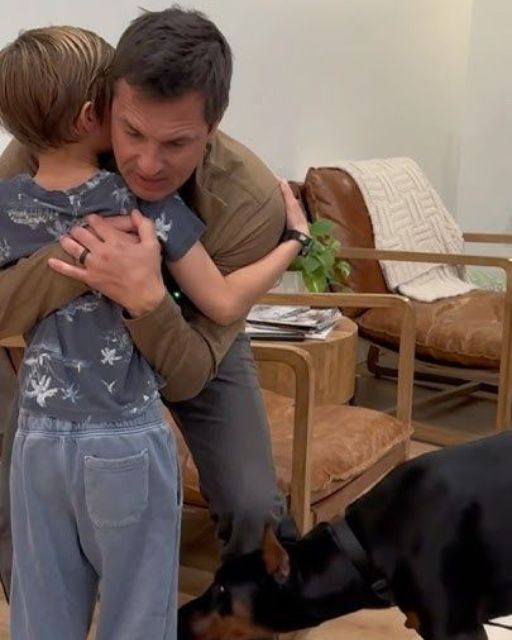I used to think that being a parent was all about biology—DNA, bloodlines, passing down a name. But then I met a little boy named Max, and everything I believed got turned upside down.
It all started quietly, the way most life-changing things do.
I was twenty-nine when I met Trisha. She had this contagious, firecracker laugh and drove an old Jeep that backfired every time she braked too hard. She also had a toddler—Max. He wore mismatched socks, scowled at me like I was a cartoon villain, and made it abundantly clear I was not welcome.
Trisha told me early on that Max’s father wasn’t in the picture. “It’s complicated,” she said one night, her voice tight. I didn’t press. I didn’t need to. I fell in love with her regardless—and eventually, with Max too.
The night I moved in, Max had the flu. Trisha was completely exhausted from a double shift at the hospital, and I found myself kneeling beside his little race-car bed, sponging his forehead, whispering silly songs to distract him. He blinked up at me with glassy eyes and murmured, “You smell like pancakes.”
I chuckled. I don’t even like pancakes.
But from that moment on, I wasn’t Nick. I wasn’t Dad. I was Pancake.
And honestly? I wore that name like a badge of honor.
Over the next seven years, everything moved quickly. Trisha and I got married in a small courthouse ceremony—Max was our ring bearer, clutching the pillow like it might explode. We bought a fixer-upper house with creaky floors and a swing set I spent two whole weekends building. We had a daughter, Ivy, who looked exactly like her mom and drooled like a Saint Bernard. And Max? He blossomed. He was quirky, brilliant, full of questions. He built robots out of cereal boxes and accidentally called me “Dad” more and more often—until one day, it stuck.
Then the questions started.
“Why is my last name different from Ivy’s?”
“How come I have brown eyes, but you and Mom have blue?”
And one day, while working on a family tree project, he asked, “Can I put down ‘Dad Pancake’ and ‘Bio Dad’?”
I froze mid-pour, holding a milk carton over a bowl.
“Bio Dad?” I repeated.
Max shrugged. “I don’t know what else to call him. The invisible guy, I guess.”
That night, I talked to Trisha. She listened quietly, then said, “Maybe it’s time. He should hear it—from you.”
Agreeing was easy. Doing it? Not so much.
So one Saturday morning, I watched Max help Ivy with cereal, both of them laughing at my terrible joke about “sock orphans.” And right then—something in his smile, or maybe just the ease of that morning—told me it was time.
Still in flannel pajama pants, heart thumping, I knelt beside him in the living room.
“Hey, buddy,” I began casually. “Can I tell you something important?”
He raised an eyebrow. “More important than Ivy putting peanut butter in the Xbox?”
So much for subtlety.
“Yeah,” I said. “Way more important.”
I told him the truth. About how I met his mom when he was two. How I wasn’t there when he was born. How I chose to be his dad, and would always choose that, again and again.
“I’m not your biological father,” I said gently. “But I love you like you are mine. Because you are.”
He didn’t cry. He didn’t flinch. He just wrapped his arms around my neck and whispered, “I already knew.”
I pulled back, stunned. “You did?”
He nodded. “I found a picture in Mom’s closet. She was holding me, and some guy was next to her. He didn’t look like you. I figured it out.”
My throat tightened. “Why didn’t you say anything?”
He shrugged. “I didn’t have to. You’re my dad.”
Cue the tears.
As we hugged, our dog Murphy—half-Lab, half-chaos—squished himself between us, wagging his tail like a maniac. Typical Murphy. Just when I was about to laugh through the tears, Max looked at me and said:
“Can I tell you something, too?”
“Of course.”
“I found him.”
The room went still. “What?”
He pulled out a folded paper from his pajama pocket.
“I looked him up online. His name’s David Ellison. He’s in Phoenix.”
I blinked, brain scrambling. “You contacted him?”
He hesitated. “No. I got scared. I wasn’t sure if I should. But… I want to know where I come from.”
I sat back, stunned, torn between fear, jealousy, and a fierce instinct to protect him. But beneath it all, louder than anything else, was this truth: Max had a right to his story.
We told Trisha that night, over bowls of ice cream. She was quiet for a long time, then said simply, “If he’s ready, we’ll support him.”
The next weekend, we drove to Phoenix. It was tense, awkward. David had responded to a message Trisha sent. He seemed sincere—regretful. Said he’d thought about Max every day, that walking away was the worst decision of his life.
When Max met him, he didn’t run into his arms. He didn’t cry. He just said, “Hi. I’m Max.”
David knelt down and smiled. “I know. You look just like me.”
Max looked back at me, then turned and said:
“I get my eyes from you. But my heart? That’s from Pancake.”
I didn’t cry then. I waited until later—when Max was asleep, and Murphy was snoring at his feet.
It’s been a year now. Max and David exchange letters sometimes. They’re not close, and maybe they never will be. But Max is no longer wondering. No longer searching. He’s whole.
This morning, I found a drawing taped to the fridge: a stick-figure family—Trisha, Ivy, Murphy, Max, and me. Above it, written in bright marker:
“Family isn’t who made you. It’s who stays.”
I still go by Pancake. And I wear that name with more pride than most men wear “Dad.”
Because Max didn’t just accept me.
He chose me.
